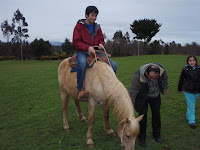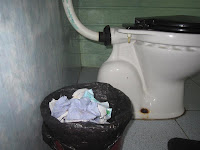I dodged
On a positive note, I was accepted to
Memories of my Brother Richard
My life forever changed on December 16th 1990. I became a brother. At first I was a little reluctant to be an older brother. My mom tells me that a few weeks after Richard was born, I told her “Okay mom, you can take the baby back to the hospital now.” But being Richard’s brother is the best thing that has ever happened to me and will forever define who I am.
Growing up, Richard was my best friend. The two of us spent hours building things out of legos, sitting around a board of Monopoly or Risk, setting up pillow forts, and playing video games. We developed a friendship that only two brothers can share, the type of relationship that forms when you use the same bathroom every morning and your rooms are side-by-side. Richard and I both loved skiing, mountain biking, and backpacking and we would always get sucked into the latest fads, like Pokemon Cards, Beanie Babies, and Pogs.
Richard and I didn’t always have a perfect relationship. We got into our share of fights too. I remember once when he was a baby, I hit him when my parents weren’t looking. My parents asked me why Richard was crying and I said “I don’t know why the baby’s crying. He’s always crying.” Even with all of the fighting though, there was never a moment when I wasn’t fiercely proud of Richard and all of his accomplishments. At Brown, I always told my friends about how he was such an awesome skier and I would show them pictures from his crazy dance parties in our garage. Richard loved everything and everyone in his life and he was never afraid to show it.
I was fortunate enough to talk to my brother on the phone two days before he died. We had not talked in a couple weeks, so we had a lot to share. I told him about my travels in Ecuador and how beautiful it was down there. He told me about his upcoming ski race and how even though he was only skiing GS, he was still excited to ski for free in Utah. The two of us planned my visit to Whitman in the spring time. I asked him about which airport I should fly into and he discussed the merits of each of them. “You could always fly into Walla Walla, but that is more expensive. Portland and Seattle are further away, but you could rent a car and make a road trip out of it.” The two of us decided that a road trip was the best option. Oh...what I would give to still be visiting Richard this spring.
God was watching over me even in the hours before my brother’s death. I was in a used book store in Ecuador and I came across a copy of Mitch Albom's “The Five People You Meet in Heaven.” The book is a quick read and I read it cover to cover that evening. The next morning my brother passed away.
The story is of an elderly man who dies and meets five people in heaven who explain to him the meaning of his life. The fourth person that he sees is his deceased wife who died many years before him. The elderly man is angry at his wife because she left him when he was still young. Responding to his anger, she tells him:
“Lost love is still love. It takes a different form, that's all. You can't see their smile or bring them food or tousle their hair or move them around a dance floor. But when those senses weaken, another heightens. Memory. Memory becomes your partner. You nurture it. You hold it. You dance with it. Life has to end, love doesn't.”
I take solace in this story, because I have so so many happy memories of my brother. Memories of jumping out of our lofts onto our beds, memories of nurf gun fights, memories of swimming together in our backyard, and memories of waking our parents up at 4 AM and opening our presents from Santa Claus. I will hold onto these memories forever.
I also take comfort in the story of the elderly man because I know that Richard will be one of the people that I will meet in heaven. He will be waiting to explain the twists and turns of my own life. He will be waiting for me just as I remember him sitting in his loft building K'nex or playing Halo.
I love you Richard and I will never stop dancing with my memories of you.
































